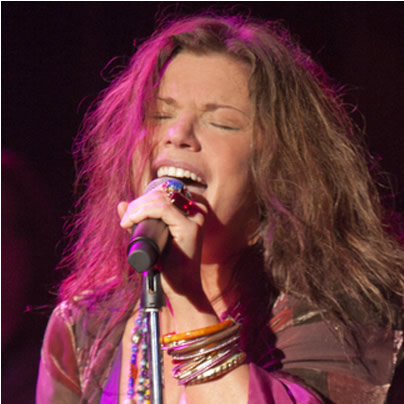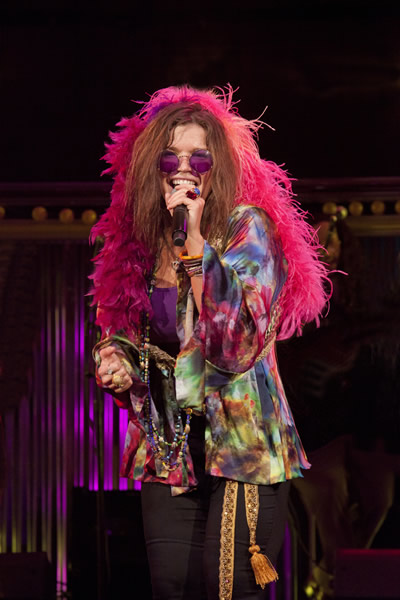Arts & Entertainment
Janis returns
Actress Davies stars again in Joplin-themed concert/theater mashup

‘One Night With Janis Joplin’
By Randy Johnson
Arena Stage
Mead Center for American Theater
Runs through Aug. 11
$40-$99 for various performances
Sundays, Tuesdays and Wednesdays at 7:30 p.m.
Thursdays, Fridays and Saturdays at 8 p.m.
Saturdays and Sundays at 2 p.m.
arenastage.org
Few music lovers — relatively speaking — had a chance to see Janis Joplin live considering she died in 1970. It’s tempting to say that “One Night With Janis Joplin,” the gay-penned (by Randy Johnson) tribute show playing now at Arena Stage, is the next best thing to the now-impossible notion of going to a Joplin performance.
And while the show is that, it’s also not just a cheesy rock tribute show of the type we see given in honor of classic rock acts all the time. It’s its own musical/theatrical experience with singer/actress Mary Bridget Davies in the title role earning raves for her uncanny ability at not just channeling but recreating Joplin’s trademark gutbucket vocals.
The show was a hit at Arena last fall when nearly 20,000 people saw it in Washington. It’s had successful engagements in Portland, Cleveland and Pasadena, Calif., and will open on Broadway at the Lyceum Theatre in October.

Mary Bridget Davies as Janis Joplin in ‘One Night With Janis Joplin.’ (Photo by Jim Cox; courtesy Arena)
Davies (34, straight and Helen Hayes Award-nominated for the role) whom we interviewed last year as well, took a few minutes with us by phone last week from her home in Cleveland to riff on everything from how the show has varied in different cities to why the Joplin allure remains undiminished decades after her untimely death. Her comments have been slightly edited for length.
WASHINGTON BLADE: How was the run at Arena versus other places you’ve played the show?
MARY BRIDGET DAVIES: Arena Stage runs like such a well-run ship. Nothing was ever a problem there. It was like summer camp for theater and we just had a really good time. I’m completely excited to come back.
BLADE: Some critics have said it seems like you were born to do this. Do you feel some cosmic destiny with Janis?
DAVIES: It’s weird, yeah, sometimes I do feel like she’s around. There are some accidental parallels too — frustrated attempts at college … she was just so free and I get to enjoy some of that. I mean, yes, I’m up there saying lines, I’m not just winging it, but she just had that wild abandon and I get to do that every night.
BLADE: Has the show changed since last fall?
DAVIES: Yes, it’s been evolving and getting tighter. We’re not like this tired old circus chorus walking in circles. We’ve had several little breaks so each time we come back excited to do it again. And I think we’ll enjoy it even more this time because the terrain is more familiar now.
BLADE: Have the crowd reactions varied much from city to city?
DAVIES: I was very, very nervous in Pasadena because it’s L.A., so anyone who was anyone came to the show. I mean, like, Cher was there one night. There was a lot of industry vibe there that gave it kind of a scary urgency. At Arena before, I would say we had the most forward people. People would try to get on the stage and dance. I kinda looked at the crew like, “Uh, what am I supposed to do here?” They would wrangle them off like in the Van Halen video. It’s kind of flattering that they were so moved they wanted to get up and jam but it does blur the lines a little. Secretly I was kinda OK with it as long as you don’t try to rip the mic out of my hand and say, “It’s my friend’s birthday.”
BLADE: Is it ever hard to find the balance between crowd interplay and performing it as a straight-up dramatic piece?
DAVIES: Yes. Like in Milwaukee we had this much smaller space with a modified thrust stage. It was almost more fun on one hand but also more intimidating too. If you had a bruise or something, they could see it, it was that close. As a performer you really shouldn’t let the crowd dictate the proceedings but there is something of that fourth wall break because this isn’t a straight-up dramatic piece or a musical. People don’t always realize that. They’ll be on their phone or act like they’re home watching TV. One dude went to sleep. I’m like, “Are you kidding me? This is really hard!” Another guy held a tablet on his lap and taped the entire show.
BLADE: I know technically that’s a no-no, but still, from a historical perspective, think how awful it would be if nobody had bootlegged any of Janis’s shows. We’d have so much less to go on. As long as somebody isn’t trying to profit off of it, isn’t there some value in stealth recording?
DAVIES: Oh yeah, in terms of my research and as a fan, I get that. The rock and roll part of me thinks that’s cool but then on the other hand with the copyright issues, you have to respect that too. You don’t want some 30-second barrage out of someone’s purse showing up on YouTube.
BLADE: As great a run as you’re having with this, is there some part of you that’s concerned about your entire persona and identity getting swallowed up by the myth of Janis?
DAVIES: I have people come up to me and say, “Aren’t you that Janis girl?” I wear it as a badge of honor. I think I’ve been able to maintain a balance. I just released my own album — which Arena has been very kind to let me sell at the shows — and I was nominated for a blues music award. And I take my down time to try to stay current within the industry. But you’re right, it can be a double-edged sword. … There may come a time when my heart’s not in it but for now I’m proud to be “the Janis girl.” If they were saying, “Hey, aren’t you the Ashley Simpson girl?” I’d be a lot more worried.
BLADE: Is part of the reason the show’s been such a hit is that people simply crave hearing Janis sing and this is as close as it gets at least for a live experience?
DAVIES: Yeah, I think there is some of that. It can be pretty overwhelming at times. People still go see Big Brother (Joplin’s old band) in droves, especially in Europe. People are crying. She died 43 years ago and people are still throwing themselves at my feet. Sometimes I’m like, “Whoah, I don’t know how to handle that.” I think people just miss her so much, they’ll take her any way they can get her. Other people come in rather skeptical but I always say, that’s fine. Go ahead and come in skeptical because then the end up leaving very happy.
Books
Love or fear flying you’ll devour ‘Why Fly’
New book chronicles a lifetime obsession with aircraft

‘Why Fly’
By Caroline Paul
c. 2026, Bloomsbury
$27.99/256 pages
Tray table folded up.
Check. Your seat is in the upright position, the airflow above your head is just the way you like it, and you’re ready to go. The flight crew is making final preparations. The lights are off and the plane is backing up. All you need now is “Why Fly” by Caroline Paul, and buckle up.

When she was very young, Paul was “obsessed” with tales of adventure, devouring accounts written by men of their derring-do. The only female adventure-seeker she knew about then was Amelia Earhart; later, she learned of other adventuresome women, including aviatrix Bessie Coleman, and Paul was transfixed.
Time passed; Paul grew up to create a life of adventure all her own.
Then, the year her marriage started to fracture, she switched her obsession from general exploits to flight.
Specifically, Paul loves experimental aircraft, some of which, like her “trike,” can be made from a kit at home. Others, like Woodstock, her beloved yellow gyrocopter, are major purchases that operate under different FAA rules. All flying has rules, she says, even if it seems like it should be as freewheeling as the birds it mimics.
She loves the pre-flight checklist, which is pure anticipation as well as a series of safety measures; if only a relationship had the same ritual. Paul loves her hangar, as a place of comfort and for flight in all senses of the word. She enjoys thinking about historic tales of flying, going back before the Wright Brothers, and including a man who went aloft on a lawn chair via helium-filled weather balloons.
The mere idea that she can fly any time is like a gift to Paul.
She knows a lot of people are terrified of flying, but it’s near totally safe: generally, there’s a one in almost 14 million chance of perishing in a commercial airline disaster – although, to Paul’s embarrassment and her dismay, it’s possible that both the smallest planes and the grandest loves might crash.
If you’re a fan of flying, you know what to do here. If you fear it, pry your fingernails off the armrests, take a deep breath, and head to the shelves. “Why Fly” might help you change your mind.
It’s not just that author Caroline Paul enjoys being airborne, and she tells you. It’s not that she’s honest in her explanations of being in love and being aloft. It’s the meditative aura you’ll get as you’re reading this book that makes it so appealing, despite the sometimes technical information that may flummox you between the Zen-ness. It’s not overwhelming; it mixes well with the history Paul includes, biographies, the science, heartbreak, and exciting tales of adventure and risk, but it’s there. Readers and romantics who love the outdoors, can’t resist a good mountain, and crave activity won’t mind it, though, not at all.
If you own a plane – or want to – you’ll want this book, too. It’s a great waiting-at-the-airport tale, or a tuck-in-your-suitcase-for-later read. Find “Why Fly” and you’ll see that it’s an upright kind of book.
The Blade may receive commissions from qualifying purchases made via this post.
Theater
Out actor Kevin Cahoon on starring role in ‘Chez Joey’
Arena production adapted from Broadway classic ‘Pal Joey’

‘Chez Joey’
Through March 15
Arena Stage
1101 Sixth St., S.W.
Tickets start at $93
Arenastage.org
As Melvin Snyder in the new musical “Chez Joey,” out actor Kevin Cahoon plays a showbiz society columnist who goes by the name Mrs. Knickerbocker. He functions as a sort of liaison between café society and Chicago’s Black jazz scene circa 1940s. It’s a fun part replete with varied insights, music, and dance.
“Chez Joey” is adapted from the Broadway classic “Pal Joey” by Richard Rodgers and Lorenz Hart. It’s inspired by John O’Hara’s stories based on the exploits of a small-time nightclub singer published in The New Yorker.
A warm and humorous man, Cahoon loves his work. At just six, he began his career as a rodeo clown in Houston. He won the Star Search teen division at 13 singing songs like “Some People” from “Gypsy.” He studied theater at New York University and soon after graduating set to work playing sidekicks and comedic roles.
Over the years, Cahoon has played numerous queer parts in stage productions including “Hedwig and the Angry Inch,” “La Cage aux Folles,” “Rocky Horror” as well as Peanut in “Shucked,” and George the keyboardist in “The Wedding Singer,” “a sort of unicorn of its time,” says Cahoon.
Co-directed by Tony Goldwyn and the great Savion Glover, “Chez Joey” is a terrific and fun show filled with loads of talent. Its relevant new book is by Richard Lagravenese.
On a recent Monday off from work, Cahoon shared some thoughts on past and current happenings.
WASHINGTON BLADE: Is there a through line from Kevin, the six-year-old rodeo clown, to who we see now at Arena Stage?
KEVIN CAHOON: Anytime I want to land a joke in a theater piece it goes back to that rodeo clown. It doesn’t matter if it’s Arena’s intimate Kreeger Theatre or the big rodeo at the huge Houston Astrodome.
I was in the middle stadium and there was an announcer — a scene partner really. And we were doing a back and forth in hopes of getting laughs. At that young age I was trying to understand what it takes to get laughs. It’s all about timing. Every line.
BLADE: Originally, your part in “Chez Joey” Melvin was Melba who sings “Zip,” a clever woman reporter’s song. It was sort of a star feature, where they could just pop in a star in the run of “Pal Joey.”
CAHOON: That’s right. And in former versions it was played by Martha Plimpton and before her Elaine Stritch. For “Chez Joey,” we switched gender and storyline.
We attempted to do “Zip” up until two days before we had an audience at Arena. Unexpectedly they cut “Zip” and replaced it with a fun number called “I Like to Recognize the Tune,” a song more connected to the story.
BLADE: Wow. You must be a quick study.
CAHOON: Well, we’re working with a great band.
BLADE: You’ve played a lot of queer parts. Any thoughts on queer representation?
CAHOON: Oh yes, definitely. And I’ve been very lucky that I’ve had the chance to portray these characters and introduce them to the rest of the world. I feel honored.
After originating Edna, the hyena on Broadway in “The Lion King,” I left that to do “Hedwig and the Angry Inch” as standby for John Cameron Mitchell, doing one show a week for him.
Everyone thought I was crazy to leave the biggest musical of our time with a personal contract and getting paid more money that I’d ever made to get $400 a week at the downtown Jane Street Theatre in a dicey neighborhood.
At the time, I really felt like I was with cool kids. I guess I was. And I never regretted it.
BLADE: When you play new parts, do you create new backstories for the role?
CAHOON: Every single time! For Melvin, I suggested a line about chorus boys on Lakeshore Drive.
BLADE: What’s up next for Kevin Cahoon?
CAHOON: I’m about to do the New York Theatre Workshop Gala; I’ve been doing it for nine years in a row. It’s a huge job. I’ll also be producing the “Cats: The Jellicle Ball” opening on Broadway this spring; it’s a queer-centric uptown vogue ball with gay actor André de Shields reprising his role as “Old Deuteronomy.”
BLADE: There’s a huge amount of talent onstage in “Chez Joey.”
CAHOON: There is. I’m sharing a dressing room with Myles Frost who plays Joey. He won accolades for playing Michael Jackson on Broadway. We’ve become great friends. He’s a miracle to watch on stage. And Awa [Sal Secka], a D.C. local, is great. Every night the audience falls head over heels for her. When this show goes to New York, Awa will, no doubt, be a giant star.
BLADE: Do you think “Chez Joey” might be Broadway bound?
CAHOON: I have a good feeling it is. I’ve done shows out of town that have high hopes and pedigree, but don’t necessarily make it. “Chez Joey” is a small production, it’s funny, and audiences seem to love it.

The Capital Pride Alliance held the annual Pride Reveal event at The Schuyler at The Hamilton Hotel on Thursday, Feb. 26. The theme for this year’s Capital Pride was announced: “Exist. Resist. Have the audacity!”
(Washington Blade photos by Michael Key)











































